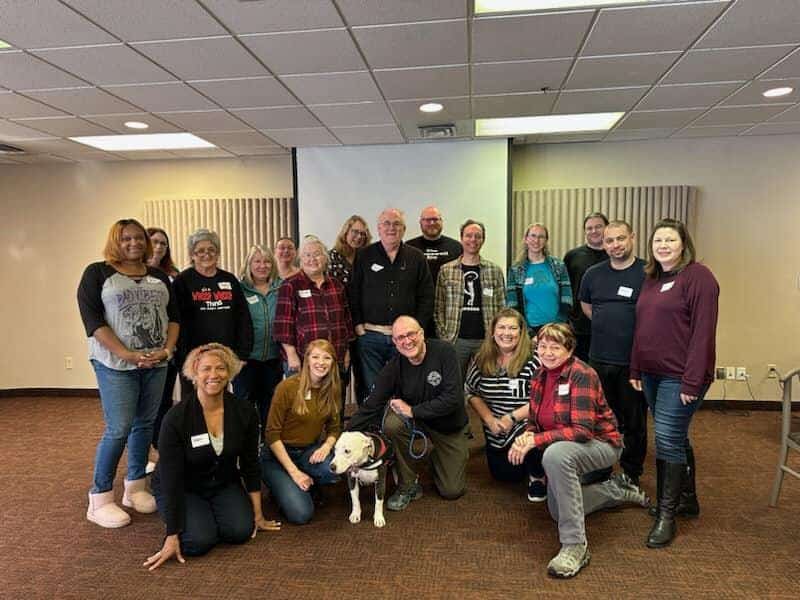I once gave a presentation, and afterward, a man from the audience approached me and asked if I was a writer.
At the time, I wasn’t actively writing, so I responded negatively.
To my surprise, he mentioned a local writer’s group that I might be interested in joining.
This was my introduction to writer’s groups.
Ever since then, I have found them to be a powerful source of inspiration, motivation, and community.
This encounter made me reflect on the significance of local writing groups and their potential benefits.
So in this blog post, we will delve into the world of local writing groups, explore what they are, how to find them, and discuss their pros and cons.

Free Universal Book Links
- Boost international sales by geotargeting readers
- Book store links update automatically based on availability
- Advanced marketing analytics
- Increase clicks with trusted links

Key Takeaways
- Community and Support: Local writing groups offer opportunities for writers to receive feedback, share ideas, and find community support, making them a significant resource for both new and experienced writers.
- Professional Growth: Writing groups help writers enhance their skills through peer critiques and provide networking opportunities that can lead to professional development, such as discovering publishing options and participating in writing competitions.
- Potential Challenges: Despite their many advantages, local writing groups can face challenges such as varying skill levels and group dynamics, which may affect the quality of feedback and overall group cohesion.
What are Local Writing Groups?

A writing group consists of a collection of people who meet regularly in person for the purpose of honing their craft and for the exchange of ideas.
Some writing groups are open to any genre, while others are genre-specific, such as my Christian writer group.
These groups provide opportunities to connect with like-minded individuals, receive feedback, find encouragement, and explore new horizons in the writing world.
Here on Vancouver Island, writing groups also offer ways to promote your books at events, such as local fairs and farmers markets.
Location and Frequency
The location can vary depending on the group’s needs. Some groups meet at someone’s house. This can be the same house each time or it can rotate so the hosting responsibilities don’t fall on one person.
Other groups meet in a public place like the library or coffee shop. Some places will let you reserve a room or table, so you are guaranteed a spot.
The frequency and length of the meeting is also based on the needs of the group. It can be every week for two hours, once a month for three hours or every other week for two hours. It’s up to the group to decide what is best.
Writing Group Format
There are different options when it comes to the format of the group. Regardless of the format, have members agree ahead of time on basic rules and expectations.
Here are a few ideas on types of groups:
Critique Before Meeting
Any writing that needs to be critiqued, is sent to group members before the meeting. Comments and feedback are added to the pages through track changes.
There is usually a deadline as to when this needs to be done. Then at the meeting, the critiques are discussed.
In this type of format, writers bring up to a certain number of pages to be read aloud during the meeting by someone other than the writer. Then feedback is given on the spot. This allows for the writer of the work to see immediate reactions.
The other plus with this type is that there is no extra time needed outside the group to do critiques.
Mastermind Group
This type of group doesn’t provide writing critiques, instead it is providing accountability and/or brainstorming. For accountability it can be to help group members get a certain number of words done each week, queries sent out, or articles written.
Then writers have to report on their progress at each meeting and talk about what is working or not.
For a mastermind it is usually a certain type like marketing or the business of writing or self-publishing. Each meeting there are discussions and brainstorming to help each member be more successful.
Mixture of Writing Time and Critique
Time is set aside during each meeting for quiet writing time. Members can be given a prompt or continue working on a current piece.
The work being critiqued can be sent ahead of time or read aloud during the group time.
Group Size
Tip!
- The size of the writing group should be dependent on how it is formatted and the amount of time you need to achieve your tasks at each meeting.
If you are critiquing, then decide if everyone has the chance to get feedback on their work each meeting or do you assign weeks where each person shares their work.
This will help you decide if it’s better to have a small group of four or one that is larger with eight.
If your group is more of an accountability group or you also include writing time during your meetings, you might be able to accommodate more writers.
Regardless, be realistic in what will work best for the group and stick to that number.
How to Find a Local Writing Group
Finding a local writing group can be an exciting endeavor, but if you don’t know where to look, you may have issues finding one.
Tip!
-
Not all local writers’ groups are created equal though. You’ll want to identify what type of group is a fit for your writing style, time commitment, and genre.
Let’s jump into some ways to find a local writers’ group!
Ask Writer Friends
Reach out to your friends and acquaintances who are writers or have connections within the writing community.
They might be aware of local groups or associations that cater to writers.
Writers Associations

Contact (and even join) local or national writing associations. This is a great way to connect with other writers in your area or even online.
Community Activities
Engage in writing-related events in your area. These sources can provide information about existing writing groups or opportunities to establish new ones.
Libraries and Bookstores
Tip!
Many times your local library and bookstores are aware of writer’s groups in the area.
Many times your local library and bookstores are aware of writer’s groups in the area. Ask them what they know about the group and if they have the contact info of the person who runs the group.
If they can’t give you the contact info, maybe they can pass on your card to the group.
Online Platforms

Explore online platforms like meetup.com, social media groups, or specialized websites dedicated to connecting writers. These platforms often host local writing groups or can help you form new ones.
While not quite local, online writing communities are the next best thing to an in-person meetup.
Local Media and Community Activities
Engage with local newspapers, community centers, libraries, or writing-related events in your area. These sources can provide information about existing writing groups or opportunities to establish new ones.
Start Your Own Group
If you cannot find a suitable local writing group, consider starting your own.
Gather a group of like-minded individuals and establish a schedule, group expectations and meeting format that works for everyone.
Starting your own group allows you to tailor it to your specific needs and interests.

Introducing:
Booklinker Collections
One landing page for all your books. 100% free.
One link for easy sharing of your books across your backmatter, websites, emails, and social media.
Pros Of Local Writing Groups
Learning and Network
For beginners, writing groups provide valuable learning opportunities.
By interacting with fellow writers, you can acquire new writing techniques, new genres, discover upcoming events in your area, and expand your network within the writing community.
Feedback and Encouragement

Writing is often a solitary pursuit, but in a writing group, you can receive constructive criticism on your writing, find beta readers, and gain valuable advice and encouragement from peers. Plus, providing feedback to other writers on their work, this helps you grow as a writer.
This collaborative environment fosters growth and development as a writer.
Marketing Support
Local writing groups can assist with book marketing endeavors. By sharing experiences and insights, group members can help each other navigate the publishing industry, identify publishers or agents, and promote their work effectively.
Skill Exchange
Writing groups provide an opportunity for members to exchange services and collaborate on various aspects of the writing process.
Whether it’s editing, formatting, or illustrating, sharing skills can reduce costs and enhance the overall quality of each writer’s work.
Accountability and Inspiration
Joining a writing group introduces an element of accountability. Setting goals and sharing progress within the group can keep you motivated and on track.
Additionally, the camaraderie and shared passion for writing can inspire and rejuvenate your creativity.
Access to Opportunities
Local writing groups often have access to exclusive opportunities, such as writing competitions and conferences.
By participating in these events, you can gain exposure, enhance your skills, and broaden your horizons as a writer.
Support during Book Launches

Launching a book can be challenging, but having a writing group by your side can provide valuable support. Members can assist with book launches, reviews.
Cons Of Local Writing Groups
Group Dynamics
Like any social setting, writing groups are subject to group dynamics, which can sometimes lead to conflicts or personality clashes.
It’s important to find a group that aligns with your values, goals, and preferred working style.
If the group dynamics become toxic or hinder your creative process, it may be necessary to reassess your involvement.
Varying Skill Levels
Local writing groups can consist of writers with different skill levels and experience.
While this can offer diverse perspectives and insights, it might also mean that the feedback and critique you receive may not always be at the level you desire.
Beginners might benefit more from groups specifically tailored to their level, while experienced writers may seek groups with more advanced members.
Compatibility and Feedback
Writing is a subjective art form, and opinions on style, genre, and writing techniques can vary significantly.
It’s possible that the feedback you receive from group members may not align with your vision or resonate with your creative choices.
Balancing the need for constructive criticism while staying true to your artistic voice can be a challenge. . You don’t have to agree with all the feedback you are given.
Just listen and don’t get defensive. It is always up to you as to what you implement or change in your work.
If you find that most of the time the critiques are not helpful, you may need to consider looking for another group.
Time and Commitment
Active participation in a writing group requires time and commitment.
Meetings, workshops, and critique sessions can take up a significant portion of your schedule.
If you have a busy lifestyle or struggle to meet deadlines, the regular commitments of a writing group may become burdensome and impede your writing progress.
You may have to re-evaluate if being part of the group is realistic or do you need to find a different type of group that requires less of a time commitment.
Limited Availability
Depending on your location, it’s possible that there may be limited options for local writing groups.
Rural areas or smaller communities may have fewer writing groups or resources compared to larger cities.
This can make it challenging to find a group that meets your needs or aligns with your writing interests.
Groupthink and Influences
Being part of a writing group may sometimes lead to a phenomenon known as “groupthink,” where conformity and the desire for consensus can stifle individual creativity and unique perspectives.
It’s important to maintain your own voice and vision, even within the group setting, and not be overly influenced by the opinions or styles of others.
Creative Dependency
While writing groups can provide valuable support and motivation, some writers may become overly reliant on the group for validation and inspiration.
It’s crucial to strike a balance between the group’s influence and your independent creative process. Ultimately, you must cultivate self-motivation and confidence in your own writing abilities.

Introducing:
Booklinker Collections
One landing page for all your books. 100% free.
One link for easy sharing of your books across your backmatter, websites, emails, and social media.
Conclusion
Writing groups are a great way to stay connected to those who share the same passion for writing that you do. They provide a way to get feedback on your writing, encouragement, inspiration and like-minded people you can “talk shop” with.
Writing can be a lonely endeavor and being part of a group can remind you that you are not alone and give you the accountability you need to keep moving forward with your projects.
Author
-
Originally from Suffolk, England, Beverley's love of writing began with many letters home to her family when she immigrated to Canada at eighteen. From the chilly North West Territories to tropical life in Cali, Colombia, her letters were sent. Bev didn't know then, but those letters became the way to hone her craft. She seeks to use the gifts that God has given for His glory. She is the author of two picture books, and both won awards. With twenty years of experience in school libraries, Bev also presented two years in succession at library conferences and often gives author visits to schools. A Seed is a Promise is set to release this fall by Castle Quay. Bev blogs about a variety of topics, and you will find her here
https://www.beverleyrayner.com/



